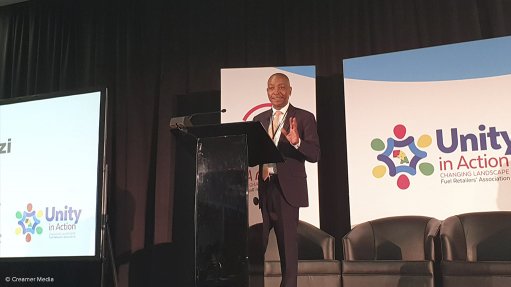
W&RSeta CEO Tom Mkhwanazi
Photo by: Creamer Media's Simone Liedtke
Skills development will take centre stage across all sectors, including that of fuel retail, as the country prepares for the Fourth Industrial Revolution (4IR), Wholesale and Retail Sector Education and Training Authority (W&RSeta) CEO Tom Mkhwanazi averred on Wednesday.
Speaking at the Fuel Retailers Association (FRA) Conference, held on the sidelines of Automechanika at the Nasrec Expo Centre, in Johannesburg, he stressed the importance of industries embracing 4IR and taking advantage of the opportunities it presented.
In response to global changes presented by 4IR, Mkhwanazi pointed out that W&RSeta would “remain committed to the [fuel] sector to bridge the skills gap”, considering that, according to recent research conducted by the association, only 32% of companies across all sectors are prepared for 4IR.
To push this figure higher, he said wholesale and retail sectors would require greater investment in data and systems analysis, as well as information technology and e-learning, among others.
There are also indications that there is a need for re-skilling throughout the sectors, he added, owing to the advent of 4IR. As a result, skills will need to be topped up with digital marketing and communications skills, as well as those of data analysis, information and communication technologies and more.
Keeping this skills gap in mind, Mkhwanazi said that W&RSeta welcomed the National Skills Development Plan (NSDP) 2030, which was launched earlier this year. The NSDP, he added, “provides a long-term approach for skills development”.
The NSDP is aligned with the National Skills Development Strategy, which has been South Africa’s skills development blueprint since 2000.
“It is up to us to embrace this new mandate and to re-commit to bridging the skills gap in the wholesale and retail sectors.”
In an effort to uphold the objectives of the NSDP, W&RSeta will convene the Wholesale and Retail Skills Development Summit in February 2020, where stakeholders and key role-players will come together to deliberate on the sectors’ contribution to the NSDP.
Among the plan’s objectives is that of reducing the unemployment rate from an all-time high of 29% currently, to 14% in 2020 and further reducing it to 6% in 2030. An additional 11-million jobs are expected to be created by 2030.
“We need to start thinking about our contribution by reducing unemployment,” Mkhwanazi told delegates, adding that this can be achieved through the creation of employment and self-employment opportunities.
On the premise of the wholesale and retail sectors being “the backbone of the economy” and the biggest contributor to South Africa’s gross domestic product, Mkhwanazi said W&RSeta continues to prioritise skills development for employees and owners in the fuel retail sector to ensure that the country “continues to move forward”.